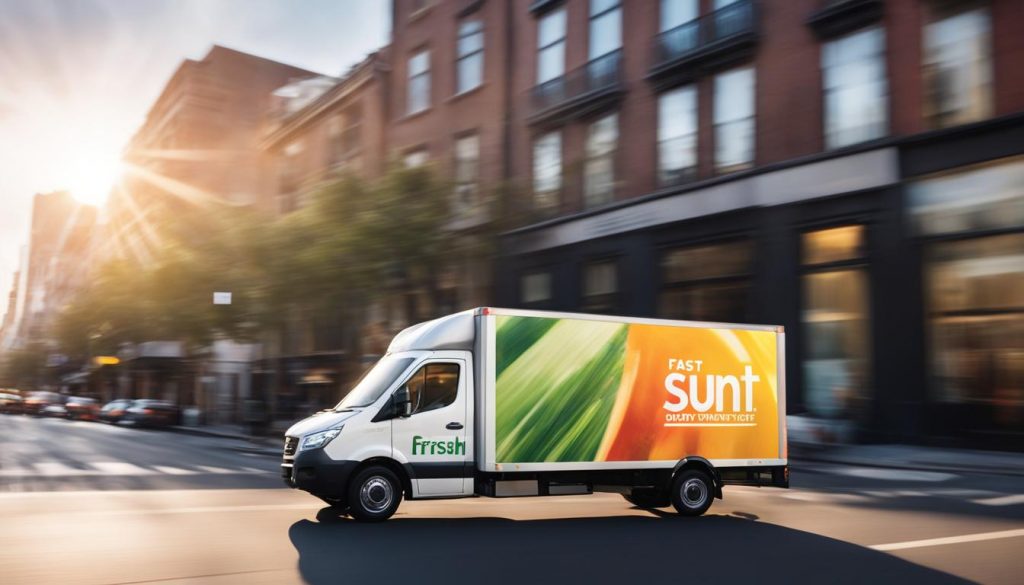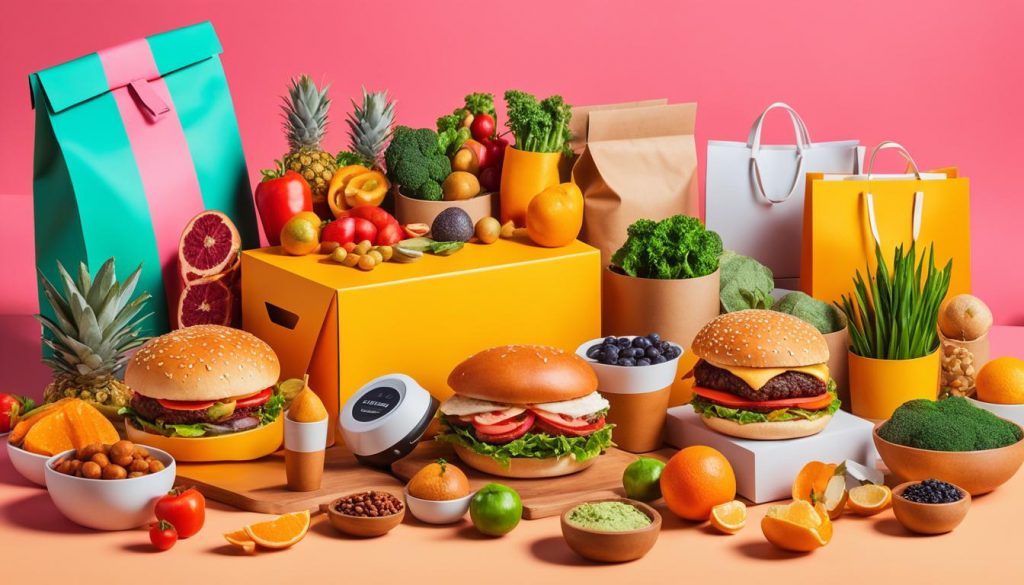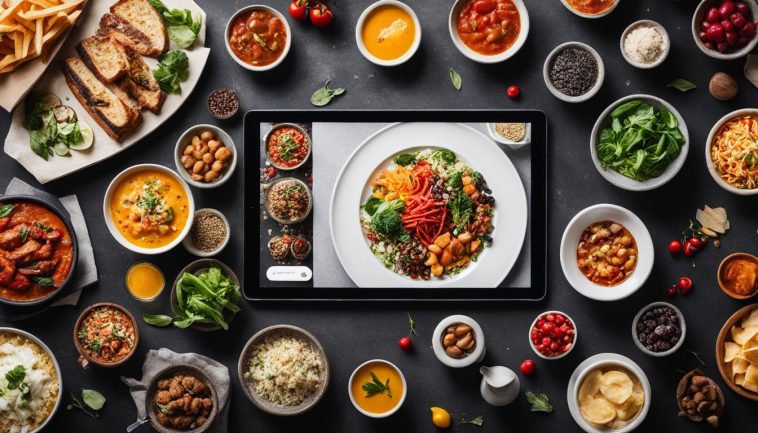In early 2022, Canadian e-commerce sales reached about $3 billion per month, with an estimated 29 million Canadians expected to shop online by year-end.
As more and more people choose the convenience and accessibility of online shopping, home-based food businesses must stay updated.
So, what can you expect to see in the food e-commerce industry in 2024?
Let’s explore some of the key trends that are shaping the way consumers shop for food online.
The importance of Cross-selling for small e-commerce businesses
Cross-selling is a popular trend in e-commerce where brands suggest companion products related to items that a customer has selected.
For example:
- If your business is homemade baked goods, you can cross-sell with items such as specialty coffee or tea, decorative baking accessories, gourmet spreads, or customized gift baskets.
- Or if you sell homemade jams and jellies, you can cross-sell with artisanal bread, cheese boards, gourmet crackers, or specialty teas.
- Maybe you are a home chef, cross-selling opportunities can include offering personalized cooking classes, kitchen gadgets, specialty spices, or customized meal plans.
Cross-selling items can enhance the overall experience for your customers and provide them with convenient options for pairing and gifting.
Effective cross-selling can significantly boost sales and enhance the overall customer shopping experience.
Consumers expect fast shipping & deliveries

Fast shipping and timely delivery are essential for online businesses, especially in the food and beverage industry.
Depending on what you sell, baked goods, jam& jellies, condiments, healthy snacks… it is something you have to think about before even launching your small e-commerce business. Especially if your home-based business specializes in birthday cakes and wedding cakes, ensure they arrive precisely on a special day, contributing to the success of the celebration.
Important to know that most people are willing to pay extra fees to have their orders faster.
To stay ahead of the competition and meet consumer demands, you must prioritize fast shipping and timely delivery. By ensuring quick and efficient delivery, your home-based food business can exceed customer expectations, build trust and loyalty, and ultimately drive online sales.
Mobile shopping
Statista’s Market Insights reported that global mobile e-commerce sales hit $2.2 trillion in 2023, constituting 60% of total e-commerce sales.
This trend allows you to connect with your customers throughout the day.
Learn more about the importance of mobile for small e-commerce businesses.
With the increasing popularity and convenience of mobile shopping, home-based food businesses, like yours, must optimize their online presence for mobile devices. By providing a seamless and user-friendly mobile shopping experience, you can capitalize on the growing trend of m-commerce (mobile-commerce) and tap into the vast potential of the mobile market.
Personalization

Research by Epsilon reveals that 80% of consumers are more likely to make a purchase when a brand offers personalized experiences.
To meet and exceed customer expectations, small food e-commerce businesses are utilizing various strategies to personalize the shopping journey.
One effective way to personalize the customer experience is through personalized product recommendations. By analyzing your customer’s data and purchase history, you can offer tailored suggestions that align with individual preferences. This not only enhances the shopping experience but also increases the likelihood of upselling and cross-selling, leading to increased sales.
Another way to personalize the customer experience is to allow them to choose specific ingredients, flavours, and dietary preferences that can really make their experience unique and special.
Have you ever thought about using personalized cart abandonment emails? By reaching out to the customers who left items in their cart, you can offer them discounts or promotions to encourage them to complete their purchases.
Benefits of Personalization trend:
- Enhance customer satisfaction
- Reduce shopping cart abandonment
- Increase sales
- Increase loyalty
- Incite brand advocacy
- Encourage repeat purchases
Influencer Marketing
Social media platforms like Instagram and TikTok are powerful platforms for your home-based food business to connect with your audience.
Influencer marketing is a key strategy, as popular influencers endorse products and create viral campaigns, influencing consumer decisions. This approach boosts online presence, drives sales, and helps establish a strong brand image through authentic content and the reach of social media influencers.
Sustainability and Health
As consumer awareness of environmental and health impacts grows, local business owners, like you, must prioritize sustainability and ethical sourcing. Transparent sourcing, sustainable production, and eco-friendly packaging appeal to health-conscious consumers.
By embracing these initiatives, your small food e-commerce business can stand out in the market, attract like-minded customers, and build strong, loyal relationships.
Subscription products

Subscription-based models, increasingly popular in the food and beverage industry, offer curated or replenishment options for convenience and reliability.
Curated subscriptions provide hand-picked items tailored to preferences, while replenishment subscriptions ensure a steady revenue for small e-commerce businesses.
The rise of food subscriptions reflects a notable shift in consumer habits, with individuals seeking convenient, dependable, and, above all, safe methods to replenish their kitchen supplies and explore fresh brands and offerings.
Ethics and Transparency
Consumers increasingly prioritize ethical food and beverage brands that offer transparency in ingredient sourcing, manufacturing, and supply chains.
93% of consumers before making a purchase, read online reviews.
Tips: Brands that prioritize ethics and transparency are likely to build stronger connections with consumers and gain a competitive edge.
The Rise of Luxury and Niche Products
The food and beverage industry has seen a rise in luxury and niche products due to changing consumer preferences.
Artisanal and small-batch production offer unique flavours and premium ingredients.
Luxury brands must provide a superior shopping experience to align with the exclusivity of their products. Consumers are willing to pay a premium for one-of-a-kind offerings and seek personalized experiences.
Online success for luxury brands involves creating a memorable customer experience through thoughtful packaging, exclusive promotions, and tailored recommendations.
Brand Collaborations
Collaborating with other food and beverage brands can help you expand brand awareness and reach new audiences.
Partnering with complementary brands taps into their customer base and extends reach in the online marketplace. Do not partner with another business that does not have the same values or that is not relevant to your business. It’s crucial to ensure that partners share similar values to maintain brand integrity and consistency.
Effective brand collaborations drive traffic, increase sales, and introduce new customers to your brand, enhancing brand awareness and growing your business in the competitive food and beverage industry.
Artificial Intelligence
AI is transforming the food and beverage industry by enhancing production efficiency, optimizing pricing, predicting consumer trends, and improving supply chain management.
By analyzing data, AI identifies operational bottlenecks, recommends process improvements, and sets competitive prices based on market trends and customer behaviour.
It also helps create innovative products aligned with evolving consumer preferences.
Additionally, AI optimizes inventory management and logistics planning, reducing waste and ensuring timely delivery.
Overall, AI offers businesses in the food and beverage industry enhanced operational efficiency, cost management, and improved customer experience, driving cost savings, innovation, and business growth. As technology advances, AI will continue to play a critical role in helping businesses thrive in the competitive marketplace.
Conclusion Key takeaways:
1/ Cross-Selling Boost: Elevate sales and customer experience by tactically suggesting related products.
2/ Swift Shipping Priority: Ensure timely deliveries to build trust, exceed expectations and drive online sales.
3/ Mobile Optimization: Capture the mobile market by optimizing platforms for seamless user experiences.
4/ Personalization Power: Increase satisfaction, reduce abandonment, and boost sales through personalized recommendations and customizable options.
5/ Influencer Marketing Impact: Utilize social media influencers for authentic content, brand engagement, and increased sales.
6/ Sustainability and Health Focus: Stand out by prioritizing sustainable and health-conscious practices.
7/ Subscription Convenience: Embrace subscription models for curated or replenishment options and steady revenue.
8/ Ethics and Transparency: Build consumer connections by prioritizing transparency in sourcing and supply chains.
9/ Luxury and Niche Success: Provide a premium experience for exclusive products, attracting willing premium-paying customers.
10/ Brand Collaborations: Expand reach by partnering with complementary brands, leveraging mutual audiences.
11/ AI Transformation: Drive growth with AI by enhancing efficiency, cost management, and customer experience.
FreshFind is your go to free eCommerce tool, built for home-based food makers. Check us out today and excel your business to the next level.





GIPHY App Key not set. Please check settings